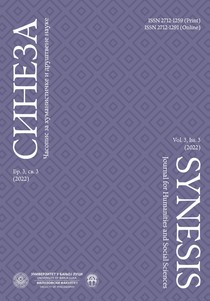Odnos osobina Alternativnog petofaktorskog modela ličnosti i testne anksioznosti: moderatorska uloga vještina upravljanja vremenom i opterećenosti obavezama
Relationship between Alternative five-factor personality model traits and test anxiety: moderating role of time management skills and course overload
Author(s): Jelena Bačić, Lana VujakovićSubject(s): Individual Psychology, Personality Psychology, Behaviorism
Published by: Filozofski fakultet, Univerzitet u Banjoj Luci
Keywords: test anxiety; personality traits; alternative five-factor model; time management skills; course overload;
Summary/Abstract: Test anxiety is the uncomfortable state of tension, fear, and physiological symptoms that appear before, during, or after the exam. Earlier studies suggest that personality traits are the best predictors of test anxiety (Jayaraman & Subramanian, 2015), although those used either the Five-Factor Model (Costa & McCrae, 1992) or Eysenck’s PEN model (Eysenck, 1991). This research aimed to investigate the relationship between the Alternative Five-Factor Model (Zuckerman, 1994) and test anxiety, as well as to see if other variables (such as time-management skills and course overload) that have been correlated with test anxiety before would affect the relationship between these two constructs. The sample comprised 264 students (83.4% females) from B&H, Serbia, and Croatia. Although the students from different fields of study could complete the questionnaire online, most of them stated that they attended the Faculty of Philosophy. The research included the following instruments: the ZKA-PQ-SF personality questionnaire (Aluja et al., 2017), the test anxiety questionnaire (Subotić & Marinković, 2018), and two one-item scales that registered time-management skills and course overload. Correlational analysis showed that test anxiety was significantly correlated with neuroticism (r = .61, p < .001) and aggressiveness (r = .26, p < .001), as well as significantly negatively correlated with time-management skills (r = .-24, p < .001) and extraversion (r = .-15, p = .01). Regression analysis showed that the model that consisted of all personality traits explained 39.6% of the variance (R = .62, R2 = .39, p < .001), which is almost the same percentage as the independent contribution of neuroticism (R = .61, R2 = .37, p < .001), but one must mention that some suppression effects were identified when placing all the predictors together in the model. Also, we found that time-management skills and course overload did not statistically significantly moderate the relationship between personality traits and test anxiety. The results suggest that personality traits are good correlates of test anxiety even outside the context of frequently used lexical models and that physiologically based personality models can be an even better tool for explaining test anxiety. Data indicating that time management skills correlated with test anxiety but that the possession of these skills did not change the intensity of the relationship that personality traits (primarily neuroticism) had with this construct are discussed, bearing in mind the importance of physiological and cognitive processes underneath. Having good time-management skills or low course overload did not have effects on test anxiety as much as personality traits did, which can be understandable considering that personality traits are much more stable components that can significantly moderate human behaviour.
Journal: Sineza
- Issue Year: 3/2022
- Issue No: 3
- Page Range: 125-144
- Page Count: 20
- Language: Bosnian, Croatian, Serbian

